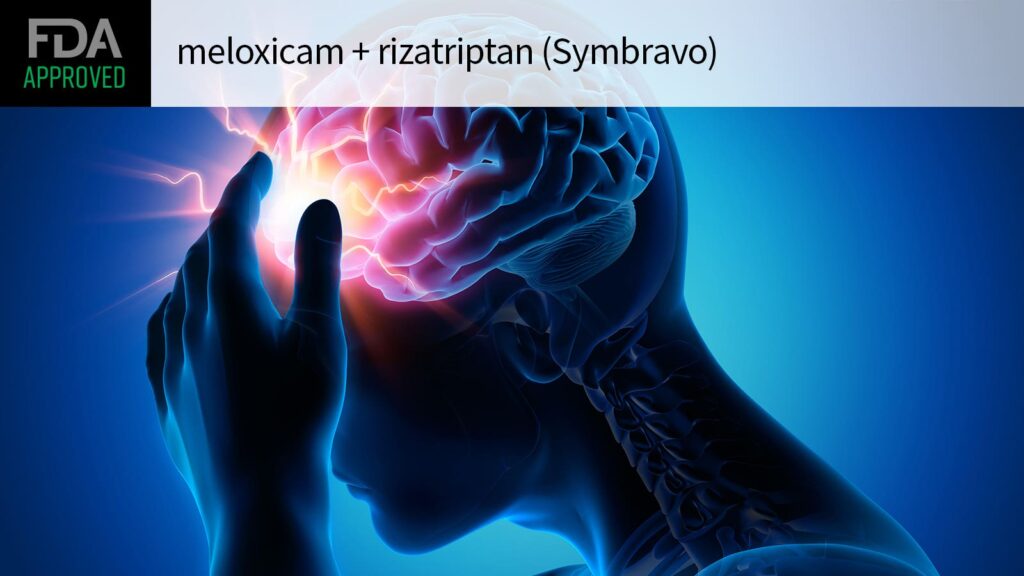The FDA approved an oral combination of meloxicam and rizatriptan (Symbravo) to treat adults with acute migraine with or without aura, Axsome Therapeutics announced.
Meloxicam is a COX-2 preferential non-steroidal anti-inflammatory drug (NSAID) and rizatriptan is a 5-HT 1B/1D agonist (triptan). The newly approved drug uses a proprietary technology called MoSEIC to increase meloxicam’s solubility and speed of absorption after the drug is taken orally while maintaining its extended plasma half-life.
“A significant proportion of migraine patients experience inadequate efficacy with currently available acute treatments, leading to even greater suffering, and an increased risk of worsening of migraine pain and attack frequency,” said Richard Lipton, MD, of Albert Einstein College of Medicine in New York City, in a statement. “Results of multiple clinical trials demonstrate that Symbravo can provide rapid and long-lasting freedom from migraine pain, whether treatment is taken early in the attack while the pain is mild, or later in the attack when the pain may be severe.”
The FDA’s decision was based on data from the phase III MOMENTUM trial of moderate and severe migraine pain intensity, the phase III INTERCEPT study when initial migraine pain was mild, and the phase III MOVEMENT long-term open-label safety trial.
In both MOMENTUM and INTERCEPT, more patients who used the meloxicam-rizatriptan combination achieved pain freedom and freedom from their most bothersome symptom (photophobia, phonophobia, or nausea) 2 hours after dosing compared with placebo. Pain freedom was sustained through 24 and 48 hours for many patients.
MOMENTUM also showed that the combination product was better than either rizatriptan or meloxicam alone: 23% of patients treated with it used rescue medication within 24 hours, compared with 35% of patients treated with either agent alone and 44% of placebo patients. In INTERCEPT, 15% who used the meloxicam-rizatriptan combination needed rescue medication within 24 hours versus 42% of placebo patients.
The most common adverse reactions in the controlled studies were somnolence and dizziness, each reported in 2% and 1% of patients in the treatment and placebo arms, respectively, Axsome said.
Prescribing information for the new meloxicam-rizatriptan product comes with a long list of precautions and contraindications. The drug’s label includes a boxed warning that spells out the increased risk of serious cardiovascular thrombotic and gastrointestinal adverse events with NSAIDs, and states the treatment is contraindicated in the setting of coronary artery bypass graft surgery.
The product may have interactions with several drugs including antihypertensives, blood thinners, diuretics, and others, Axsome said. The company expects the drug to be commercially available in the U.S. in approximately 4 months.
-
Judy George covers neurology and neuroscience news for MedPage Today, writing about brain aging, Alzheimer’s, dementia, MS, rare diseases, epilepsy, autism, headache, stroke, Parkinson’s, ALS, concussion, CTE, sleep, pain, and more. Follow
Please enable JavaScript to view the

